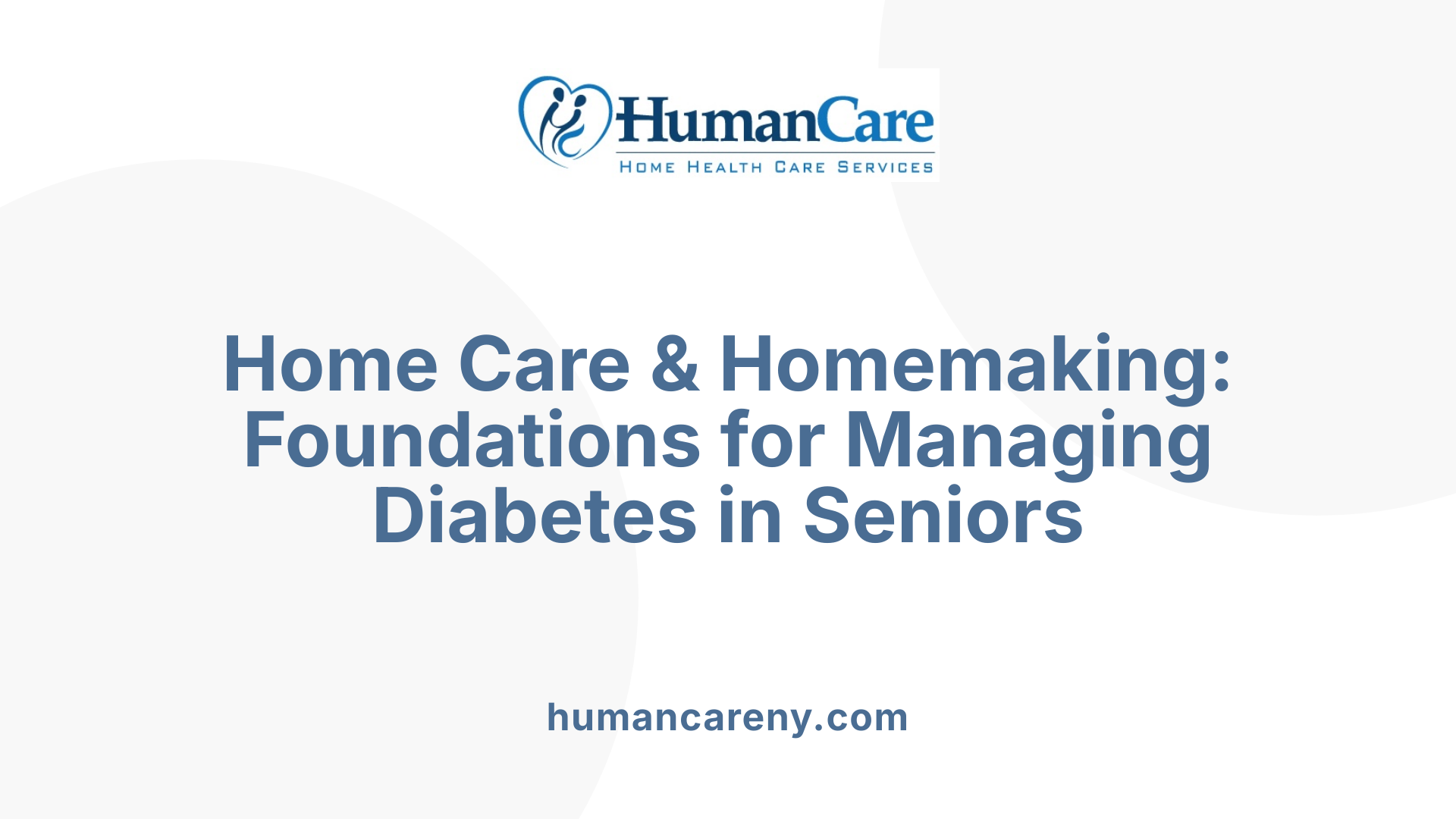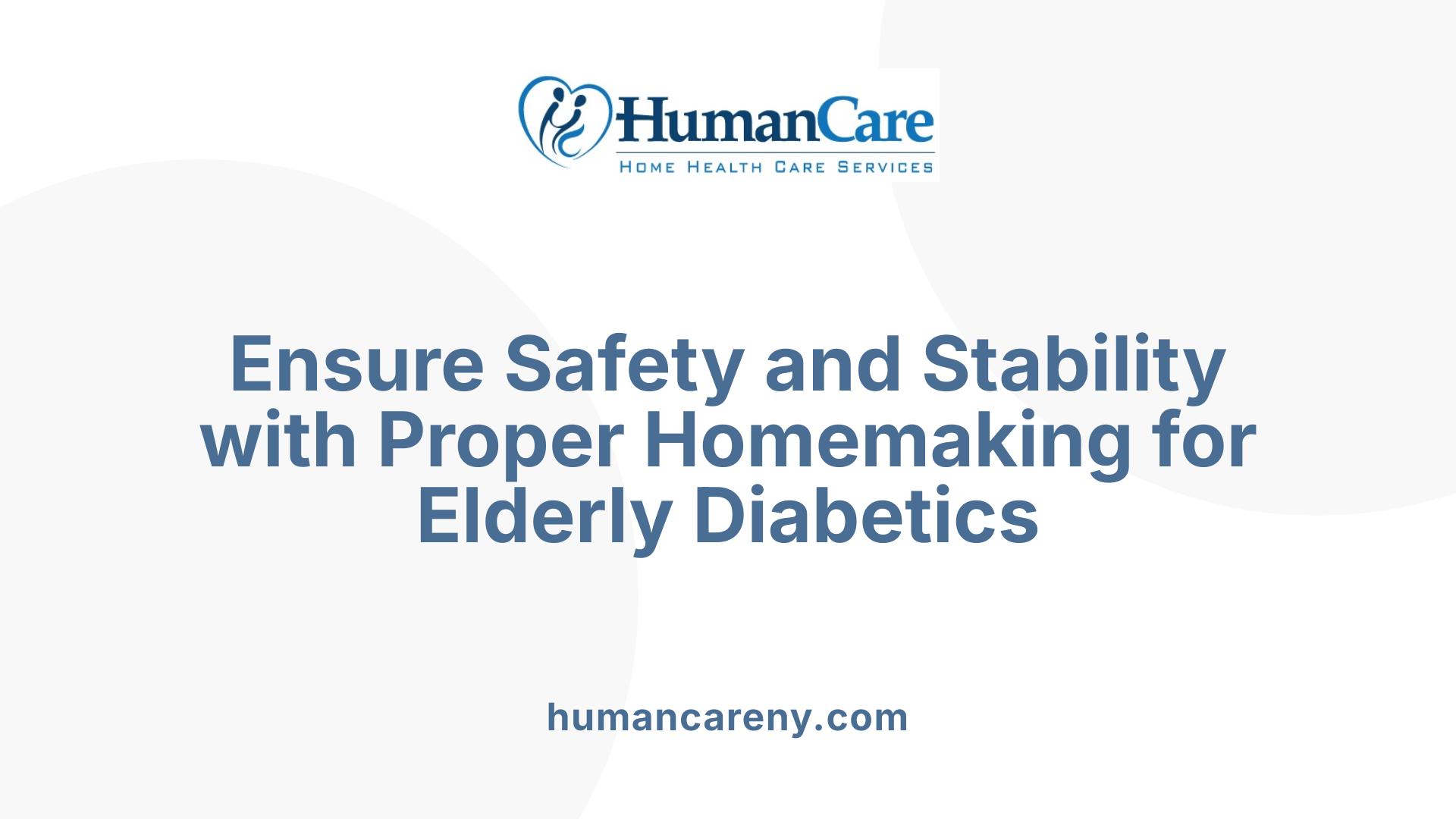Understanding the Need for Homemaking and Home Care in Elderly Diabetes Management
Diabetes is a common chronic condition among older adults, with nearly 30% of those aged 65 or above affected. Managing diabetes effectively in seniors is complex, involving medications, diet, and physical activity, and is crucial for preventing severe complications like heart disease and kidney failure. Homemaking and home care play an indispensable role in supporting elderly patients to maintain health, safety, and independence. This article explores why personalized home-based support systems are essential, highlighting best practices, scientific evidence, and practical strategies to enhance health outcomes for seniors with diabetes.
The Impact of Home Care on Diabetes Management in Seniors

What are the benefits and impacts of home care on managing diabetes in seniors?
Home care plays a vital role in helping older adults manage their diabetes effectively. By offering personalized support, it significantly enhances safety and health outcomes. Caregivers assist seniors with daily tasks such as blood glucose monitoring, ensuring they check and log their levels correctly. They also help with medication reminders and administration, which reduces errors and missed doses — a common risk for seniors.
Meal planning and preparation are crucial components of diabetes care. Home caregivers help seniors choose nutritious, balanced meals tailored to their health needs, supporting better blood sugar control. Light physical activities like walking and stretching, encouraged and supervised at home, can lower HbA1c levels and improve cardiovascular health.
Emotional support from caregivers reduces feelings of loneliness, stress, and anxiety, all factors that influence blood sugar stability. Transportation assistance ensures seniors receive regular medical check-ups, access medications, and buy healthy groceries.
Research shows that home visits can decrease glycated hemoglobin (HbA1c) by nearly 0.8%, lowering the risk of diabetes-related complications. They also help reduce systolic and diastolic blood pressures, important for cardiovascular health. Overall, home care fosters a safer environment, promotes independence, and helps seniors maintain a better quality of life.
These benefits highlight the importance of customized, consistent care at home, which supports seniors in managing their diabetes while living safely and comfortably in their own homes.
Homemaking and Home Care as Pillars of Elderly Diabetes Support

What is the significance of homemaking and home care for elderly individuals with diabetes?
For seniors living with diabetes, homemaking and home care serve as foundational elements that support effective disease management. These services include assistance with daily routines, medication reminders, blood sugar monitoring, and maintaining a safe and hygienic environment.
Home care providers help establish consistent routines for medication adherence and blood glucose checks, which are critical for controlling diabetes and preventing serious complications like kidney failure or vision loss. They also assist with nutritional support by planning and preparing diabetes-friendly meals, as well as enabling safe physical activity, such as walking or stretching exercises tailored to the individual's ability.
Safety measures, including fall prevention and hygiene management, are integral parts of home care. Caregivers monitor skin conditions, assist with mobility, and support activities of daily living to reduce risks associated with diabetes, such as hypoglycemia or infections.
Moreover, emotional support and companionship provided by home caregivers help reduce stress, which can positively influence blood glucose levels. Assistance with transportation ensures access to medical appointments and pharmacies, fostering ongoing health management.
Multiple studies support the importance of home-based care; systematic reviews have shown that home visit programs can significantly improve blood sugar control (lowering HbA1c by nearly 0.8%) and reduce blood pressure, both vital for overall diabetes management.
Overall, homemaking and home care are essential for helping elderly diabetics maintain independence, improve their health outcomes, and enjoy a better quality of life. These services foster a proactive, personalized approach to managing diabetes in the comfort of one’s home environment.
Effective Care Strategies and Practice Guidelines in At-Home Diabetes Management

What care strategies and best practices are recommended for at-home diabetes management among elderly patients?
Managing diabetes effectively at home, especially for older adults, requires a tailored approach that considers individual health conditions, cognitive and physical abilities, and support networks. Personalized care plans form the foundation of good management, helping to address specific needs and challenges.
Routine blood glucose monitoring is vital. Home caregivers assist with checking blood sugar levels, keeping logs, and recognizing signs of blood sugar imbalance like hypo- or hyperglycemia. Simplified medication regimens and reminders reduce errors and ensure adherence, crucial to maintaining stable glucose levels.
Lifestyle modifications involve nutrition, physical activity, and stress reduction. Caregivers support meal planning and preparation of diabetic-friendly foods, encouraging balanced diets that help control blood sugar. They also promote safe physical activities such as walking, stretching, and light exercises tailored to each individual's abilities, which can lower HbA1c and improve overall health.
Education plays a central role. Caregivers provide important information about managing diabetes, recognizing warning signs, and avoiding complications. Regular follow-ups and communication with healthcare providers ensure the care plan stays relevant and effective.
Screenings for common geriatric issues—like foot and eye care, vaccinations, and assessment of comorbidities—are integrated into routine care. Coordination with a multidisciplinary team enhances the management of coexisting conditions such as arthritis, depression, and sensory neuropathy.
Documentation and systematic follow-up are crucial but often inadequate. Better record-keeping can improve safety and outcomes, guiding adjustments in treatment plans.
In summary, a comprehensive, individualized strategy encompassing monitoring, medication adherence, lifestyle changes, and caregiver involvement helps elderly individuals with diabetes maintain independence, prevent complications, and improve their quality of life.
Safety and Well-being: Why Proper Homemaking Is Crucial for Elderly Diabetics

Why is proper homemaking and home care important for health outcomes and safety in elderly diabetics?
Proper homemaking and home care play a vital role in managing diabetes among older adults. They help ensure that daily routines, such as medication management and blood glucose monitoring, are maintained consistently. This consistency is essential in preventing dangerous fluctuations in blood sugar levels.
Home caregivers support elderly diabetics by assisting with nutritious meal preparation, engaging in gentle physical activities like walking, and monitoring for any signs of infection or foot ulcers. These measures significantly reduce the risk of falls, injuries, and diabetes-related complications.
Emotional support from caregivers can lower stress levels, which positively impacts blood sugar control. Additionally, caregivers help facilitate access to healthcare services by providing transportation to medical appointments and coordinating care plans.
Effective in-home support fosters a safer environment, encouraging independence while reducing potential hazards. It enhances overall health, promotes stability, and improves quality of life, making comprehensive home care an essential component of diabetes management for seniors.
Preventing falls and injuries
Falls are a major concern for seniors with diabetes because they are at higher risk of complications due to sensory neuropathy, muscle weakness, and hypoglycemia. Home caregivers can assist with mobility, ensuring clear walkways and proper footwear. Regularly monitoring blood sugar levels and educating about hypoglycemia symptoms also help prevent falls caused by dizziness or weakness.
Medication safety and error prevention
Ensuring correct medication use is critical. Caregivers assist with medication routines, read labels, and check for correct doses to avoid errors. They remind seniors to take medications on schedule, reducing the risk of hypo- or hyperglycemia. Proper documentation and revisiting medication plans with healthcare providers further improve safety.
Monitoring for complications
Regular monitoring helps catch early signs of complications like infections, foot problems, or unintentional weight loss. Home care providers assist with blood glucose checks, documenting results, and noticing symptoms such as numbness or wounds. Prompt reporting of changes to healthcare providers helps prevent hospitalizations.
By focusing on these areas through effective homemaking, caregivers improve health stability and safety for elderly diabetics, ultimately enhancing their wellbeing and independence.
Scientific Evidence Supporting the Efficacy of Home-Based Interventions
 Research demonstrates that home care significantly benefits elderly individuals managing diabetes. Studies show that structured home visit programs can lower HbA1c levels by approximately 0.79%, contributing to better blood sugar control. This reduction is crucial in decreasing the risk of diabetes-related complications like heart disease and kidney failure.
Research demonstrates that home care significantly benefits elderly individuals managing diabetes. Studies show that structured home visit programs can lower HbA1c levels by approximately 0.79%, contributing to better blood sugar control. This reduction is crucial in decreasing the risk of diabetes-related complications like heart disease and kidney failure.
Beyond glycemic improvement, home care also positively impacts cardiovascular health by reducing systolic blood pressure by nearly 6 mmHg and diastolic blood pressure by over 6 mmHg. These changes lower the risk of stroke and heart attacks, addressing vital aspects of diabetic health.
Broader health and quality of life see marked enhancements through home-based interventions. Patients experience improvements in lipid profiles, including increased HDL levels and decreased LDL and triglycerides. Additionally, enhanced self-management behaviors, better emotional well-being, and increased safety contribute to overall life quality.
| Aspect of Care | Outcomes | Additional Details |
|---|---|---|
| Glycemic control | HbA1c decreased by 0.79% | Based on seven randomized controlled trials with 686 participants globally |
| Blood pressure | Systolic reduced by ~5.94 mmHg; Diastolic by ~6.32 mmHg | Reduces cardiovascular risks |
| Lipid profile | Improved HDL, LDL, triglycerides | Enhances cardiovascular health |
| Quality of life | Noted improvements | Includes emotional support and safety |
| Self-management | Better adherence and routines | Encouraged through education and reminders |
Overall, evidence supports that tailored home care strategies improve not only biological markers but also overall health and well-being. Such interventions are particularly effective in a community setting, helping elderly individuals maintain independence, reduce hospitalization rates, and enhance their quality of life.
Promoting Independence and Better Health Through Home Care
Supporting elderly individuals with diabetes through comprehensive homemaking and home care services is essential for optimizing health outcomes, preventing complications, and enhancing quality of life. Regular monitoring, personalized support, and emotional care foster a safer and healthier environment at home. Scientific research continuously affirms the positive impact of home-based interventions, emphasizing their role in reducing blood sugar levels, cardiovascular risks, and hospitalizations. Tailored home care plans empower seniors to manage their condition with confidence, maintain independence, and enjoy improved well-being. Investing in dedicated home care services is not just a healthcare strategy—it’s a vital contribution to the dignity, safety, and health of elderly diabetics.
References
- The Importance of Home Care for Older Adults Living with ...
- The Importance of Home Care for Individuals with Diabetes
- Are home visits an effective method for diabetes ...
- How Home Care Benefits Diabetic Seniors
- Documented diabetes care among older people receiving ...
- Caring for Community-Dwelling Older Adults With Diabetes
- Why Elderly Diabetics Need In-Home Nursing Care



